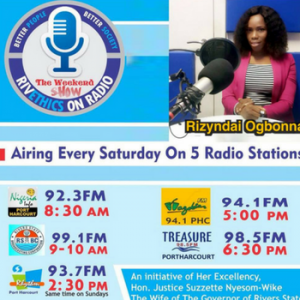 Greetings to the wonderful people of Rivers State and welcome to another episode of RivEthics on Radio, our character-building weekend show. Please remember that a kind gesture can reach a wound that only compassion can heal. This episode is in Commemoration of the United Nations’ World Humanitarian Day.
Greetings to the wonderful people of Rivers State and welcome to another episode of RivEthics on Radio, our character-building weekend show. Please remember that a kind gesture can reach a wound that only compassion can heal. This episode is in Commemoration of the United Nations’ World Humanitarian Day.
World Humanitarian Day is a day dedicated to recognise humanitarian personnel and those who have lost their lives working for humanitarian causes. It is a time to recognize those who face danger and adversity in order to help others. The day was designated by the General Assembly to coincide with the anniversary of the 2003 bombing of the United Nations headquarters in Baghdad, Iraq, which killed 22 UN staff. Every day humanitarian aid workers help millions of people around the world, regardless of who they are and where they are. World Humanitarian Day is a global celebration of people helping people. World Humanitarian Day is held every year on 19th of August to rally support for people affected by crises around the world.
According to a United Nations report, the global security environment has become increasingly complex. It is unlikely to improve in the near future while the overall social, political and economic factors underpinning insecurity persist. Although millions of people have been lifted out of poverty, tempering the socioeconomic conditions in which instability thrives, the number of conflicts is on the rise and they are lasting longer. This has had a devastating impact on civilian populations, which have been affected by violence, widespread destruction of infrastructure and loss of essential services, and has contributed to the greatest global migration crisis since the Second World War. By the end of 2016, some 130 million people required emergency assistance for their survival and protection, almost 200 per cent more than a decade earlier.
A lack of political solutions, fueled by deep international or regional divisions has continued to worsen the security conditions in protracted conflicts. In some areas, food insecurity and natural disasters have had an impact on communities that were already vulnerable, owing to poverty, isolation or inequality.
As we remember and honour all humanitarian workers around the world, we must resolve to be proactive and deliberate in taking steps to minimize conflict potentials in our communities, our State and the Country as a whole. The consequences of fanning the embers of conflict are very dire for both the victims and aid helpers as well.
Our guest speaker today is Ms. Rizyndai Ogbonna, a Principal Legal Aid Officer, and she will be sharing with us her insights on the topic. Please enjoy the episode.
Our caring Rivers people, remember to always let your manners speak for you.
God bless and keep you and your families. And God bless Rivers State.
From Her Excellency,
Justice Eberechi Suzzette Nyesom-Wike,
The Wife of His Excellency,
Nyesom Ezenwo Wike CON. GSSRS. POS (Africa).
You can also listen to and download the Pidgin English version of this Episode below
